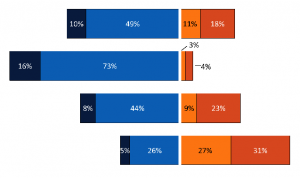From Ecclesiastes:
Again I saw that under the sun the race is not to the swift, nor the battle to the strong, nor bread to the wise, nor riches to the intelligent, nor favor to the skillful; but time and chance happen to them all. For no one can anticipate the time of disaster. Like fish taken in a cruel net, and like birds caught in a snare, so mortals are snared at a time of calamity, when it suddenly falls upon them.
(From the Daily Office Lectionary – Ecclesiastes 9:11-12 (NRSV) – June 11, 2014)
 We got up this morning to the startling news that a major political figure had been defeated in his party’s primary by a candidate supported by what I would call an extremist fringe element of the party, a group which has gained more say and more influence in the party than it should have. I didn’t write a lectionary reflection until late in the day because, political news junkie that I am, I spent the morning listening to the radio pundits and perusing the on-line publications. Over and over I found the commentators using hyperbolic metaphors — earthquake, tornado, disaster, calamity — and asserting that the defeat was entirely unforeseen. “Wow!” I thought, “They sound like Qoheleth in today’s reading from Ecclesiastes!”
We got up this morning to the startling news that a major political figure had been defeated in his party’s primary by a candidate supported by what I would call an extremist fringe element of the party, a group which has gained more say and more influence in the party than it should have. I didn’t write a lectionary reflection until late in the day because, political news junkie that I am, I spent the morning listening to the radio pundits and perusing the on-line publications. Over and over I found the commentators using hyperbolic metaphors — earthquake, tornado, disaster, calamity — and asserting that the defeat was entirely unforeseen. “Wow!” I thought, “They sound like Qoheleth in today’s reading from Ecclesiastes!”
One of the reasons given for the failure of the losing politician and his handlers to have foreseen the potential (now actual) loss was that they relied (to quote one news source) “on their own internal polling.” When I heard those words I remembered the last presidential election. In that election, the losing candidate and his party also were supremely confident of victory based on their “own internal polling.” One of his operatives went so far as to argue with a supportive news organization when its analysts came to the (accurate) conclusion that the current president was the winner.
It occurs to me that reliance on one’s “own internal polling” is a dangerous thing. The words “own internal polling” might be code for “self-deluding fantasy.”
We have much better predictive abilities now than in the time of King Solomon of Israel (who is reputed to have been the preacher who authored Ecclesiastes). We have a reasonable ability to foretell the weather, although tornadoes still surprise us. Hurricanes and major weather fronts, storm surges of the sea, and dry hot winds that fan forest fires can all be tracked and prepared for. Earthquakes and volcanic eruptions are beyond our prophetic capabilities, though scientists seem to be closing in on ways to prognosticate seismic activity.
We have a better ability to prepare for calamities and disasters — better means of food preservation, faster ways to evacuate potentially affected areas, swifter communication. We can prevent plagues and epidemics through vaccination, and we can treat them with antibiotics and other medications.
What we seem no better at doing is avoiding self-delusion. We still (all of us, not just politicians) rely a too much on our “own internal polling.” And when we do, we get overtaken by surprise, by events that seem to be (or, at least, are described as) disastrous and calamitous. Perhaps we should be listening to more than those internal polls?
It seems to me that those losing politicians might have been better served by taking a look at the polling numbers of independent opinion surveys and not relying so heavily on their “own internal polling.” They may not have been able to change the outcome, but at least they would have been better prepared for it; it would not have been such a surprise, such a “disaster” or “calamity.”
A few days ago, I was in conversation with a bible study group considering the question “How do you know you are responding to God’s call?” Nearly everyone’s initial response was, “Well, when it feels right,” but after discussion we came to the realization that our internal feelings, our “own internal polling,” aren’t often accurate. A better barometer of God’s call to us, of God’s will for us, is the discernment of the community. Checking one’s feelings with others turned out to be our consensus as to how to know whether we are answering that call, checking some independent rather than internal polling.
Qoheleth concludes today’s reverie with a couple of proverbs, one of which is political: “The quiet words of the wise are more to be heeded than the shouting of a ruler among fools.” (v. 17) Given today’s political news, we might say that the quiet words of others are more to be heeded than one’s “own internal polling.”
====================
A request to my readers: I’m trying to build the readership of this blog and I’d very much appreciate your help in doing so. If you find something here that is of value, please share it with others. If you are on Facebook, “like” the posts on your page so others can see them. If you are following me on Twitter, please “retweet” the notices of these meditations. If you have a blog of your own, please include mine in your links (a favor I will gladly reciprocate). Many thanks!
====================
Father Funston is the rector of St. Paul’s Episcopal Church, Medina, Ohio.



Leave a Reply